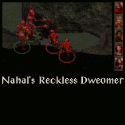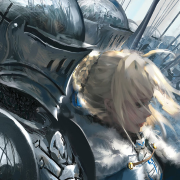|
Bhaal posted:I don't remember if it was a D&D variant rule somewhere for some edition or from somewhere else that I can't remember, but I seem to recall a system that treated multiclassing as a sort of add-on to the feat/perk economy of the system. Basically every class had a short cherry-picked list of abilities/passives as a sort of subclass flavoring that you could pick up. So, say your fighter reaches a new level and has a choice between things like Alertness, Toughness, etc. or she can instead choose to grab the "Rogue subclass" and get one or two rogue signatures that stick with her and scale appreciably as she continues to level as a fighter--like sneak attack and a skill proficiency or something like that. Splicer fucked around with this message at 22:34 on Sep 30, 2015 |
|
|
|

|
| # ? May 31, 2024 06:05 |
|
The man thing is that the whole LEGO classes thing exists only because "3.x did it," and it was pretty much never playtested in 3.x. When you look t the 3.0 playtests you get very little multiclassing, and you get a lot of druids with scimitar focus or clerics that never cast buff spells. It's important to note that 5e is a game that got less playtesting then the game it copied (due to throwing away most of the playtesting), which was itself barely playtested in the slightest.
|
|
|
|
Mendrian posted:a generalized rule that can apply to almost any case. You mean like, "It's Up To The DM!™" ? 
|
|
|
|
thespaceinvader posted:You get edge cases all over the loving shop in board games, too. Board games are the kings of edge cases. I specifically meant games like Catan or Monopoly, where you are given an explicit list of the things you may do, and how you may do them. D&D, and the vast majority of PnP RPGs, aren't like that.
|
|
|
|
ProfessorCirno posted:It's important to note that 5e is a game that got less playtesting then the game it copied (due to throwing away most of the playtesting), which was itself barely playtested in the slightest. It still bothers me that they did this. Cause at one point NEXT seemed like a half decent game.
|
|
|
|
P.d0t posted:You mean like, "It's Up To The DM!™" ? Heh. One of the nice things about the difficulty table in 4e is that you always knew about how hard poo poo at-level should be; it was a generalized rule that covered many situations. In Netrunner, you know that you always resolve cards starting with whoever's turn it actually is, which will lead you out of the reeds most of the time (but not all of the time). A lot of this is just stating the design intent as a rule and letting the players resolve from there. Part of 5e's problem is that even the rules themselves are ambiguous and the design intent is 'the DM will use whatever is best for her story' instead of what is best for the game.
|
|
|
|
Ignoring prestige classes for a moment, 3e cleric multiclassing was probably the best example of how things should have been working across the board. Almost everybody had some reason to take a level or two of cleric, but it wasn't mandatory, and going pure cleric was also a viable path. As far as base classes went, doing a shitload of dipping never made an overpowered character, either. Might have been able to cheese qualifications to prestige classes, but that was mostly because prestige classes were badly implemented. 'Yes let's not have this say must be level 10, let's have 13 ranks of, I dunno, profession (nose-blower)'.
|
|
|
|
Tunicate posted:Might have been able to cheese qualifications to prestige classes, but that was mostly because prestige classes were badly implemented. 'Yes let's not have this say must be level 10, let's have 13 ranks of, I dunno, profession (nose-blower)'. The Anarchic Initiate is a class that allows for Wilders to be even more wilder-y and chaotic because that makes for fun gameplay to some designer out there somewhere. Of course a pure wilder can't qualify for the Anarchic Initiate without figuring out some way to become trained in two extra class skills that aren't on it's list.
|
|
|
|
Tunicate posted:Ignoring prestige classes for a moment, But it's still a dumb idea and requires a character who wants to be good at X to have exponential rules-knowledge. Like yes, for the most part (particularly for casters) base multiclassing was a bad idea. But getting really good at some very specific martial thing typically required access to multiple classes (base and prestige alike) to get the best possible bonus in the least number of levels. Class options should be silo'd within the class and should be broad enough to enable a variety of ideas within it. This is one of the problems with DnD's martials, in general; they gain power through increasing specialization, instead of through broadening of ability or through creative application of powers that they do have. Having a class feature that gives you a +2 to hit when you're using bows is pretty powerful as a feature, sure. But why not an ability that gives you a +2 to hit any time you're making a ranged attack? Now you have the same accuracy bonus but it applies to multiple archetypes. Or any time you use two hands. Or whatever.
|
|
|
|
fool_of_sound posted:I specifically meant games like Catan or Monopoly, where you are given an explicit list of the things you may do, and how you may do them. D&D, and the vast majority of PnP RPGs, aren't like that. Yes, they are. Yes, they really, really are. What do you think rulebooks are? Just because the list is longer, and a lot of people advocate ignoring it, doesn't mean the list doesn't exist. (And, for that matter, just because one of the things the list might say is 'improvise' doesn't mean it's not an explicit list of things you can do)
|
|
|
|
Kurieg posted:The Anarchic Initiate is a class that allows for Wilders to be even more wilder-y and chaotic because that makes for fun gameplay to some designer out there somewhere. I think the best example of a dumb prereq has to be 'survivor', though. "Highest base save bonus must be lower than character level. " Not only does it mean that survivors often end up disqualifying themselves for their own prestige class, suspending them in a state of simultaneously having the class and not having it (which is dumb, but is how the rules were written), but it also means that a first level commoner qualifies for it. Mendrian posted:But it's still a dumb idea and requires a character who wants to be good at X to have exponential rules-knowledge. Like yes, for the most part (particularly for casters) base multiclassing was a bad idea. But getting really good at some very specific martial thing typically required access to multiple classes (base and prestige alike) to get the best possible bonus in the least number of levels. I'd say that's more a balance problem than a problem with lego multiclassing in and of itself. If this were a pure point-buy system, you'd still need the same amount of rules-knowledge to know that there was a five-point 'underground spear mastery' option offered in 'races of the underdark' or whatever. Of course the constant accumulation of piddly bonuses in 3e is another issue that's linked to it because really you shouldn't need to scrape together seven different sources of +2 attack or whatever. Along with how spellcasting got about 50% more powerful with each spell level. Tunicate fucked around with this message at 23:02 on Sep 30, 2015 |
|
|
|
Tunicate posted:Yeah, it's just really badly done. Also means that abilities that messed with spell levels (like heighten spell metamagic modifiers) were practically useless legitimately, but totally broke the power curve because now you could qualify earlier-than-intended for prestige classes. If it were a point-buy system, yes. If there were no way to accumulate cross-class abilities the problem evaporates. It's just that your classes need to be competently designed such so that a number of versatile options exist within the class to begin with.
|
|
|
|
thespaceinvader posted:Yes, they are. Yes, they really, really are. What do you think rulebooks are? Just because two situations can be described with the same words (using different definitions of the words) does not make those two situations the same. 'Improvise' explicitly being on the list of things you can do means that the list of things you can do is no longer an explicit list of options. Even though it is still a list that explicitly lists options.
|
|
|
|
Mendrian posted:If it were a point-buy system, yes. If there were no way to accumulate cross-class abilities the problem evaporates. It's just that your classes need to be competently designed such so that a number of versatile options exist within the class to begin with. Why stop there? Let's go whole hog on it, and just have a list of pre-balanced character builds for each level.
|
|
|
|
Mendrian posted:If it were a point-buy system, yes. If there were no way to accumulate cross-class abilities the problem evaporates. It's just that your classes need to be competently designed such so that a number of versatile options exist within the class to begin with. I actually kind of like 2es system, even though I play a pretty modified version of it that kinda sucks. In 2e, multiclassing as it's now known is called dual classing and is for humans only. It's actually even more powerful since levels are xp based, and different classes level differently. Iirc there's no xp cap, so taking a level of fighter for hps and weapon mastery, then a level of rogue for skills, then finally going wizard has no drawback. But since it's human only no big deal. Every other race can multiclass, where they split their xp evenly between two classes and level both simultaneously. So they're always lower level than everyone else but have more abilities. I think they also lose some of the higher level abilities but can't remember if that's right or not. Also since demihumans are level capped this helps them in longer campaigns.
|
|
|
|
mastershakeman posted:I actually kind of like 2es system, even though I play a pretty modified version of it that kinda sucks. IIRC while leveling Wizard you can't use any of your Fighter abilities or you immediately stop gaining Wizard-XP until the next time you gain a level of Fighter, as an example.
|
|
|
|
To this day it boggles my mind that the Dual Classing rules were a real thing that somebody looked at, said "Yeah, this makes perfect sense," and then printed.
|
|
|
|
Mendrian posted:IIRC while leveling Wizard you can't use any of your Fighter abilities or you immediately stop gaining Wizard-XP until the next time you gain a level of Fighter, as an example. I think it was on an adventure or encounter basis, but yeah.
|
|
|
|
Mendrian posted:IIRC while leveling Wizard you can't use any of your Fighter abilities or you immediately stop gaining Wizard-XP until the next time you gain a level of Fighter, as an example. I totally forgot that. So basically it was just for hps and saves. The frustrating part of 2e is trying to remember what was house rules vs supplements.
|
|
|
|
ProfessorCirno posted:The man thing is that the whole LEGO classes thing exists only because "3.x did it," and it was pretty much never playtested in 3.x. When you look t the 3.0 playtests you get very little multiclassing, and you get a lot of druids with scimitar focus or clerics that never cast buff spells. Well that and multiclass mechanics make full playtesting exponentially more impossible than it already was.
|
|
|
|
thespaceinvader posted:(And, for that matter, just because one of the things the list might say is 'improvise' doesn't mean it's not an explicit list of things you can do) Oh, well I guess if 'improvise' counts as an explicit rule in the same way as 'roll 2d6 then bull the space or pay the owner, both for the price listed', then I guess there are no such thing as edge cases! You're right!
|
|
|
|
mastershakeman posted:How did the hate loving work, was it combat with melee weapon rolls or was it some sort of skill challenge (acrobatics???) Basically player kept Inappropriately hitting on high level NPC, DM got fed up and said "ok, you know what? She says "gently caress it, it's been a lovely day" grabs you by the collar and drags you upstairs" DM the proceeded to describe in graphic detail player being made a bitch, and concluded with "and take 20 points of nonlethal damage" Had to be there but it was pretty hilarious.
|
|
|
|
Solid Jake posted:To this day it boggles my mind that the Dual Classing rules were a real thing that somebody looked at, said "Yeah, this makes perfect sense," and then printed. Dual-classing was loving weird, but it seems closer to what 3e and 5e eventually did than 2e multiclassing. 2e multiclassing front-loaded all the character's power and slowed their leveling to compensate. I remember having a half-elven wizard/psion/cleric in a 2e dark sun game. Yeah it was dumb.
|
|
|
|
Tunicate posted:Why stop there? Let's go whole hog on it, and just have a list of pre-balanced character builds for each level. The advantages of a class system are that you trade in a certain degree of flexibility in exchange for a host of benefits. These benefits include but are not limited to a metric to roughly judge a party's capabilities by, easier balancing (a level 5 x and a level 5 y should be roughly equivalent), reduced required player knowledge (since the fighter has zero reason to look at anything labelled wizard and vice versa), and greater freedom to do crazy stuff within a class (only need to check fighter stuff for interactions with other fighter stuff). If you allow the mix and match of 3.x and 5e you throw all those benefits away, and now you have all the negatives of point buy, none of the benefits of either, and a host of new problems unique to the combo.
|
|
|
|
2nd ed dual classing worked like this: You must be human. -You start in your first class. You must have a 15 in your prime requisite in this class. -At any point after you reach 2nd level, you may decide to change your class. You must have a 17 in the prime requisite for your new class. You can start in as many new classes as you want, one after the other, but you can never go back and advance a class you've "left". -You start your new class at first level with 0xp. You retain hit points/HD, but not any other abilities. You don't gain/lose exceptional strength when switching to/from Fighter. Your to-hit and saving throws are the ones from your new class and level. -*If you use any of your previous class's abilities (including attack numbers or saving throws, weapons, armor, etc), you don't gain xp for the encounter, and get only half xp for the adventure. -*You don't gain HD or hit points from your new class. Stuff marked * goes away when the level of your new class exceeds (not equals) the level of your highest-levelled old class. These requirements tend to mean that you're not going to be able to do the obvious OP stuff. It's still a stupid complicated system, but you're not going to get your Cleric with exceptional strength, weapon specialisation, and thief skills unless you Elector_Nerdlingen fucked around with this message at 00:57 on Oct 1, 2015 |
|
|
|
I was re-reading the last rules Q&A thing, and realized something stupid.quote:Does the Trance trait allow an elf to finish a long rest in 4 hours? The intent is no. The Trance trait does let an elf meditate for 4 hours and then feel the way a human does after sleeping for 8 hours, but that isn’t intended to shorten an elf’s long rest. A long rest is a period of relaxation that is at least 8 hours long. It can contain sleep, reading, talking, eating, and other restful activity. Standing watch is even possible during it, but for no more than 2 hours; maintaining heightened vigilance any longer than that isn’t restful. In short, a long rest and sleep aren’t the same thing; you can sleep when you’re not taking a long rest, and you can take a long rest and not sleep. Apparently the only two options for a game world to exist in are one where elves spend 4 hours resting, and 4 hours pondering why the rules of the universe prevent them from doing anything worthwhile until 8AM. Or one in which elves rule the world with an iron fist due to their extra 4 hours of activity in the day.
|
|
|
|
AlphaDog posted:2nd ed dual classing worked like this: Dual classing was terrible and kludgey and led to characters that were much weaker than the party average for a while but then shot ahead once they hit their XP breakpoint, or just were always weaker depending on your system knowledge. It really could do some pretty OP stuff, but it was actively bad for trying to balance around. So, yeah, a pretty accurate model for 3E multiclassing.
|
|
|
|
Kurieg posted:I was re-reading the last rules Q&A thing, and realized something stupid. Why yes, the way to do this is to careen from one extreme to the other. It's called game design, why do you ask?
|
|
|
|
Tunicate posted:Ignoring prestige classes for a moment, 3e Druid is a much better example. Going with a prestige class as a druid means you give up actual class features. You end up with a real tradeoff where a Druid who goes for a prestige class gets neat abilities but loses stuff like Wildshape. Of course, in practice there was practically nothing that justified that trade, but the theory is there. 3e Cleric is an awful example because literally any +1spellcasting class/level class is better than straight Cleric as long as there are no dead levels. Cleric has garbage for class features tied to its base class. If you're going to have a class system with multiclassing, you need to have actual tradeoffs take place when characters step out of their main class. Otherwise you end up trading basically nothing for more power, which ends up being a poor thing for the game.
|
|
|
|
Darwinism posted:Dual classing was terrible and kludgey and led to characters that were much weaker than the party average for a while but then shot ahead once they hit their XP breakpoint, or just were always weaker depending on your system knowledge. It really could do some pretty OP stuff, but it was actively bad for trying to balance around. It's one of the weirder options in core 2nd ed, that's for sure. In my experience it generally produced characters who, when they switched class, dropped behind single-classed or multi-classed PCs and stayed there. I guess it kinda works out OK when your DM goes "you have 450,000 xp to make characters for this game" or whatever your DM did for starting at high levels. Unless they did "start at level X", which I don't think anyone was stupid enough to actually do. I'm probably weird, but I kinda liked the idea of classes advancing at different rates. Probably because it confused my teenage brain and made everythign look balanced. I should dig out the books and look at the actual numbers and find out how wrong I was.
|
|
|
|
Splicer posted:Oh slippery slope arguments It works quite well in descent, hero quest, and a bunch of other games, both tabletop and computer. Why should a game allow the players' rule mastery (or lack thereof) give them a permanent boost or handicap based on what character they picked?
|
|
|
|
AlphaDog posted:I'm probably weird, but I kinda liked the idea of classes advancing at different rates. Probably because it confused my teenage brain and made everythign look balanced. I should dig out the books and look at the actual numbers and find out how wrong I was. It's kind of like OSR D&D's rules for Magic-User spellbooks and spell acquisition and spell components: it worked fairly well as a balancing mechanic, but it's still not quite something you might want to do in modern contexts because it's a lot of fiddly bookkeeping and rulesmanship and balance can be achieved another way. Different leveling rates necessitates strict tracking of multiple digit XP and XP-per-monster and XP-for-gold and all that stuff. Having everyone level at the same rate changing how you need to approach inter-class balance, but it comes with the ability to handwave-away leveling rates to "whenever it feels right"
|
|
|
|
gradenko_2000 posted:It's kind of like OSR D&D's rules for Magic-User spellbooks and spell acquisition and spell components: it worked fairly well as a balancing mechanic, but it's still not quite something you might want to do in modern contexts because it's a lot of fiddly bookkeeping and rulesmanship and balance can be achieved another way. I've not read the mechanics in question, but bookkeeping isn't a problem even in modern contexts unless it's enough as to make people loathe to do it, or it substantially slows play.
|
|
|
|
Not specific to 5e, but of late I've been using this online tool called encountr.io to track HP levels and turn order.fool_of_sound posted:I've not read the mechanics in question, but bookkeeping isn't a problem even in modern contexts unless it's enough as to make people loathe to do it, or it substantially slows play. That's what I was talking about. I'll grant that modern tech can make such things less of a hassle, but having to dole out XP amounts per encounter and other such busywork isn't a very compelling activity.
|
|
|
|
gradenko_2000 posted:That's what I was talking about. I'll grant that modern tech can make such things less of a hassle, but having to dole out XP amounts per encounter and other such busywork isn't a very compelling activity. Yeah, agreed.
|
|
|
|
AD&D xp is fiddly as gently caress. 2nd ed is only a little bit better. If you're doing 2nd ed by the book, the DM is supposed to track xp gained from killing monsters and * For fighters, 10xp per HD of creatures defeated. *For clerics, 100xp per successful use of granted power, 100xp / spell level of spells cast to further ethos, the XP value of potions, scrolls, or permanent magic items created. * For wizards, 50xp / spell level of spells cast to overcome problems, 500xp / spell level of spells successfully researched, XP value of potions, scrolls, or permanent magic items created. *For rogues, 100xp per successful use of special ability, 2xp per gp value of treasure obtained, 5xp per HD of creatures defeated for bards only. So I guess you could say that it makes people loathe to do it and it substantially slows play, but in case you were wondering exactly how stupid this makes things... A thief who sneaks past a guard, climbs a wall, finds a trap, disarms it, unlocks a chest, hides from another guard, climbs back down the wall, and sneaks back past the first guard to find he's stolen a +1 dagger, is now second level. Rounds are a minute long, so she's probably got this done in less than a quarter of an hour. Alternatively, she could just climb 13 walls on different occasions and level up. Meanwhile, the cleric of the woodland god is arguing with the DM because she's used entangle on a group of orcs, but he doesn't think it counts as "spells cast to furhter your ethos", as those orcs weren't currently threatening a forest (this is literally the example from the DMG, by the way). While that's going on, the fighter is fighting orcs. They are worth 15xp + 10xp for having 1hd. The fighter needs to kill 81 orcs to get to second level. I have very nice memories of 2nd ed, but parts of it are deeply, deeply stupid. Elector_Nerdlingen fucked around with this message at 04:28 on Oct 1, 2015 |
|
|
|
On the flipside though, the Thief is still pretty bad even when he's a level or two above everyone else.
|
|
|
|
Slimnoid posted:On the flipside though, the Thief is still pretty bad even when he's a level or two above everyone else. The thief progresses the fastest even if the DM doesn't hand out any of that bonus stuff. Bards also progress the same and aren't awful. e: One of the reasons lots of people think thieves (and especially bards) are bad in 2e is that they compare at equal levels and rogues by design are often 2-4 levels ahead of everyone else. Elector_Nerdlingen fucked around with this message at 04:35 on Oct 1, 2015 |
|
|
|
AlphaDog posted:AD&D xp is fiddly as gently caress. 2nd ed is only a little bit better.  I want to try running AD&D 2e sometime, but now I'm not so sure? I don't think I even read any of that while going through the books.
|
|
|
|

|
| # ? May 31, 2024 06:05 |
|
Eh, you get a rhythm going with it and it becomes not awful. That's not to say it's good design or fun to do though. I used to make up cheat sheets with check boxes and just tick them off as people did the thing.
|
|
|
























